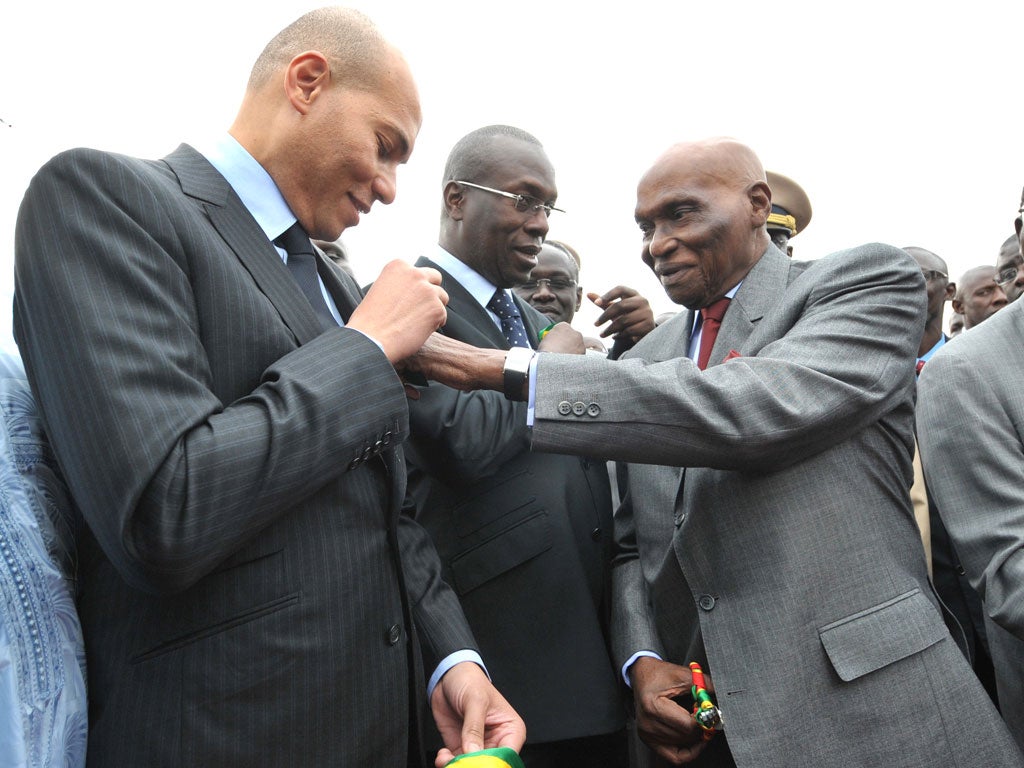Jeers and boos for President as election leaves Senegal divided
Son and heir-apparent of 85-year-old leader is accused by critics of acting like a king

Your support helps us to tell the story
From reproductive rights to climate change to Big Tech, The Independent is on the ground when the story is developing. Whether it's investigating the financials of Elon Musk's pro-Trump PAC or producing our latest documentary, 'The A Word', which shines a light on the American women fighting for reproductive rights, we know how important it is to parse out the facts from the messaging.
At such a critical moment in US history, we need reporters on the ground. Your donation allows us to keep sending journalists to speak to both sides of the story.
The Independent is trusted by Americans across the entire political spectrum. And unlike many other quality news outlets, we choose not to lock Americans out of our reporting and analysis with paywalls. We believe quality journalism should be available to everyone, paid for by those who can afford it.
Your support makes all the difference.Senegal's President was jeered and booed at his local polling station yesterday as he cast his vote in an election that has left West Africa's most feted democracy dangerously divided.
Abdoulaye Wade, 85, has dismissed opposition to him running for a third term, in violation of the constitution, but was forced to confront the anger of ordinary voters who shouted "old man" and chanted at him to "leave". Two steps behind a president accused of acting like a king was his deeply unpopular son, Karim Wade, who has emerged as the heir-apparent and been handed control of much of the government.
Mr Wade's son by his French wife, Viviane, was educated in France and has been given "super minister" status with four portfolios, stoking fears that the 43-year-old is being groomed to succeed his father when he steps down.
"It is beyond ridiculous that this man who has no credentials comes here and rules over us," said Marieme Sow, a university graduate who was one of the voters heckling the Wades at the polling station in the capital, Dakar. "Senegal is a democracy, not a monarchy. You have to prove yourself and come up from the bottom."
Abdoulaye Wade, once a popular opposition leader who drew hundreds of thousands to his rallies and whose election 12 years ago was hailed as a breakthrough, has become an autocratic figure concerned with vanity projects, such as his £22m African Renaissance Monument, built by North Koreans.
His son is seen by many in Senegal as an outsider, marked out by his pale complexion and inability to speak the country's dominant language, Wolof.
Many Senegalese joke that Karim has become the "minister of air, sky and water" after being handed the lucrative energy and infrastructure portfolios, as well as being made Minister of State and International Co-operation. An attempt to install him as the mayor of Dakar two years ago was roundly rejected by voters, and efforts to amend the constitution to establish a powerful vice-presidency were scrapped after public protests.
"The young man is everywhere but his only legitimacy is his father," said Cheikh Tidiane Gadio, a former foreign minister who left the government to run against Mr Wade in this election. He said the Senegalese were ready to "give their lives" to stop another Gaddafi or Mubarak from installing his son, calling it: "The tragedy of the transfer of power in Africa."
Many of the politicians running against Mr Wade have entered the opposition only after seeing their own chances of succession ended by the promotion of his son.
The two leading contenders to take the contest to a second round, Idrissa Seck and Macky Sall, are former prime ministers who defected from the ruling party.
Mr Wade has exploited a divided and tainted opposition, while his opponents have appealed in vain against him running for a third term. Demonstrations designed to force the incumbent to leave have failed to draw the crowds needed to put him under real pressure, while the music icon Youssou N'Dour's bid to run against the incumbent was ruled out on a technicality.
An African Union delegation led by the former Nigerian president Olesegun Obasanjo has held talks with all sides about a possible transitional government and appealed for calm ahead of early results expected later today.
Join our commenting forum
Join thought-provoking conversations, follow other Independent readers and see their replies
Comments